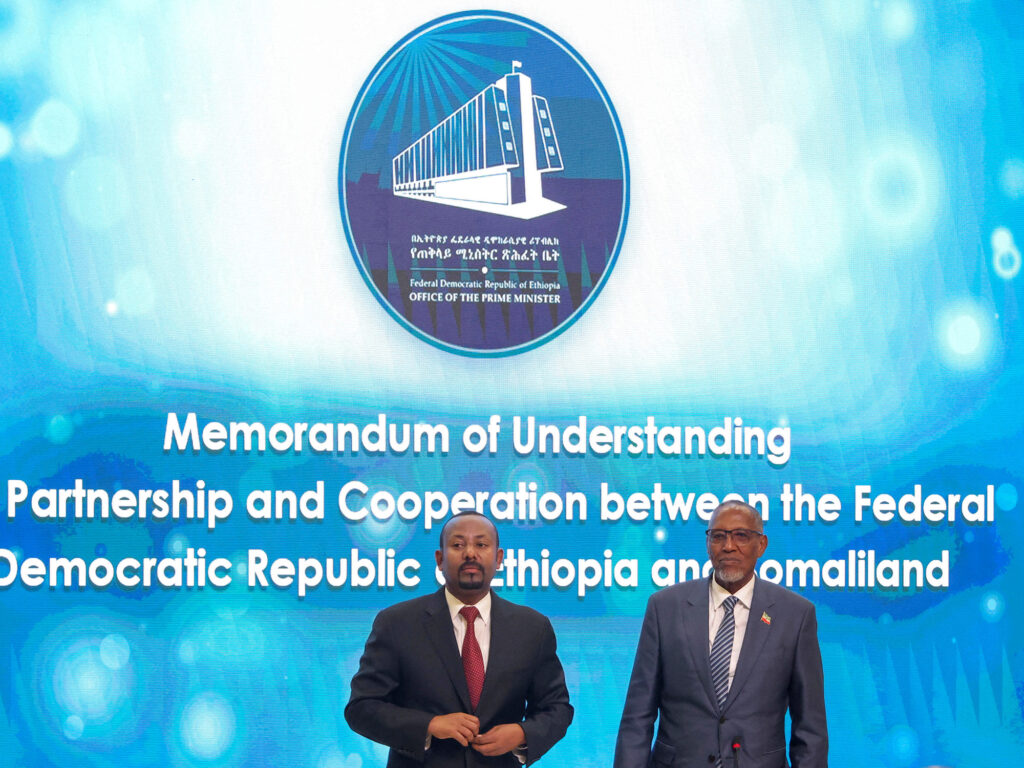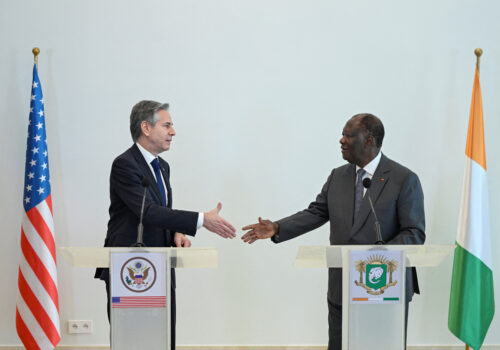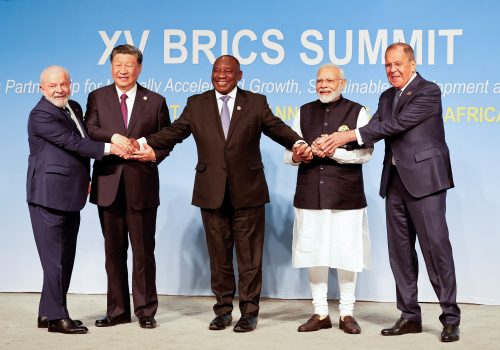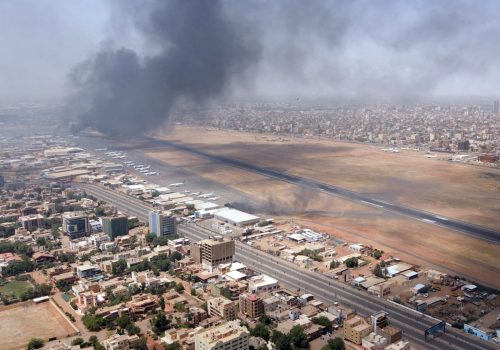Tensions from the Israel-Hamas war have spilled into the Red Sea. But while global leaders are focusing intently on everything happening in the waters of the Red Sea and to the north of it, they’ll also need to monitor geopolitical developments to the south—on the Horn of Africa.
Those developments are in the form of two significant agreements that Somaliland (an unrecognized republic in the north of Somalia that self-declared independence in 1991) struck with countries in the region. The developments could bring simmering conflicts to a boil or add significantly to regional instability in the Horn; on the other hand, they could potentially advance peace and prosperity in the region. The uncertainty about what will follow these agreements, even in the months after they were signed, is due cause for global leaders to monitor the situation closely.
A communiqué with Somalia
The first agreement is a communiqué, which followed a meeting between Somaliland President Muse Bihi Abdi and Somali President Hassan Sheikh Mohamud in Djibouti on December 28 last year. In the communiqué, the countries’ officials agreed to resume diplomatic discussions, implement previous agreements, resolve ongoing conflicts, and bolster cooperation on security and organized crime.
While initially promising, the deal has raised tensions for civilians across the region. Some Somalilanders I spoke with saw the agreement—which referred to the breakaway territory as the “northern regions” instead of the “Republic of Somaliland”—as a threat to Somaliland’s perceived sovereignty. Having the agreement signed by Somaliland’s minister of the interior, Mohamed Kahin Ahmed, instead of the foreign minister further signaled that the agreement was being approached as an internal Somali affair rather than an agreement between two sovereign entities. On their end, some Somalis were displeased that the communiqué referred to Somaliland’s delegation as the Government of Somaliland (rather than the Somaliland administration).
Abdi’s term as president of Somaliland has also been marred by delayed elections, causing controversy and leading some to believe he has no mandate to make such decisions. Opposition parties such as the Somaliland National Party (Waddani) and the Justice and Welfare party (UCID) have capitalized on this, accusing the president of jeopardizing Somaliland’s sovereignty. Both Abdi and Mohamud returned to their cities under scrutiny.
The Somalia-Somaliland communiqué’s calling on both parties to resolve ongoing conflicts brings to mind conflict in the regions of Sool, Sanaag, and Cayn, where a violent war over sovereignty has tarnished Abdi’s (and Somaliland’s) international reputation. Some civilians in these regions would prefer to not be governed by Somaliland, but rather become their own federal member state of Somalia—a real threat to Somaliland’s fight for independence and a humanitarian burden to both Somalia and Somaliland. Resolution of these internal conflicts would benefit both Somaliland and Somalia.
An MOU with Ethiopia
The second agreement is a memorandum of understanding (MOU), signed by Abdi and Ethiopian Prime Minister Abiy Ahmed on January 2, granting Ethiopian naval forces access to twenty kilometers of Somaliland coastline for fifty years. In return, Abiy agreed that the Ethiopian government would engage in an “in-depth assessment” of Somaliland’s recognition. Somaliland also received a stake in Ethiopian Airlines.
Ethiopia has been eyeing sea access since Eritrea’s 1993 independence left Ethiopia without a coastline and reliant on Djibouti for port access. Abiy has repeatedly called Red Sea access an existential question for his country, worthy of holding talks with Eritrea; eventually, rumors that Ethiopia may invade Eritrea to secure port access spread, escalating regional tensions. Reestablishing a presence in the Red Sea with the MOU would not only benefit Ethiopian commercial interests, but also revive Abiy’s political legacy, which has been tainted by his handling of conflict in Tigray and the development of new crises in Amhara and Oromia.
Abdi returned from Addis Ababa to see thousands lining the streets, waving flags and expressing a patriotic fervor. If Ethiopia (an influential member of the African Union) were to recognize Somaliland, it could be a game-changer for the breakaway region, helping advance its quest to be recognized internationally, particularly as it faces pushback from Mogadishu. On the social platform X, some pro-Somaliland users prematurely celebrated Somaliland becoming the fifty-fifth state in Africa—despite it not having yet won any additional recognition globally. On January 7, Abdi convened a meeting of Somaliland’s political stakeholders to discuss the agreement, which a Somaliland official said showcased the president’s inclusive approach.
Despite these signs of support, things have not been entirely smooth sailing for Abdi. Protests occurred in the Somaliland city of Borama, where hundreds chanted “our sea is not for sale” in opposition to Ethiopian troops in their territory. Moreover, just days after the MOU was signed, the Somaliland minister of defense resigned in protest. This domestic Somaliland pushback challenges and complicates Abdi’s efforts to sell this deal as a complete victory for the Somaliland cause.
Somalia sees this agreement as a violation of its sovereignty and Mohamud has already signed a law nullifying the MOU. This largely symbolic move is Somalia’s way of asserting its jurisdiction over Somaliland; Somalia views Ethiopian efforts to establish a presence in Somaliland as an attempt to illegally infringe on its territorial integrity and sovereignty. Somalia and Ethiopia have fought devastating territorial wars in the past, and this decision also invokes the trauma within this fraught relationship. Many in Somalia have boycotted Ethiopian Airlines. Somalia even forced an Ethiopian Airlines flight (which was carrying Ethiopian officials bound for Somaliland) back to Addis Ababa. If this deal fully materializes, it could undo progress Mohamud has made to reintegrate Somalia into international institutions, sort out domestic tensions, and fight terrorist group al-Shabaab: Somali officials suggested that al-Shabaab would take up arms following the MOU, with al-Shabaab leaders swiftly issuing a call to defend Somalia’s territory.
The global response begins to take shape
In the weeks since the signing of these agreements, Washington has seemingly stuck to its “one-Somalia” policy, with several statements by top US diplomats reiterating the United States’ support for Somalia’s territorial integrity. However, a US State Department official also said that the United States supported conversations between the people of Somalia and Somaliland about their shared future, leaving the door open for potential future support depending on the results of those conversations. This also comes on the heels of an informal softening of long-standing positions, as indicated by diplomatic visits to Somaliland, such as one by General Stephen Townsend, commander of US Africa Command, in May 2022.
Beyond the Biden administration, US Representative Ilhan Omar (D-MN)—the first Somali-American to serve in Congress—gave a speech to Somali constituents largely in support of Somalia, invoking ire from both Republicans in Congress and Somalilanders with US ties.
The United Kingdom, one of Somaliland’s closest Western partners, has also expressed deep concern over the MOU, encouraging restraint and acknowledging its support of Somalia’s territorial integrity. However, one member of parliament called for the United Kingdom to recognize Somaliland in light of these developments.
The Arab League, led by Egypt (which has a complicated relationship with Ethiopia), has been steadfast in its support for Somalia. However, DP World, a Dubai-based developer that is already heavily invested in Berbera Port, has continued to express interest in developing the port alongside Ethiopia and Somaliland. This could be an indication that the United Arab Emirates could shift its policies vis-à-vis Somaliland and the Arab League.
The African Union and the Intergovernmental Authority on Development (IGAD) have joined the international community’s call for restraint and reiterated their support for Somalia’s territorial integrity. However, Somalia rejected African Union mediation, arguing that there was no room for mediation until Ethiopia retracts the MOU and reaffirms Somalia’s sovereignty. Meanwhile, Ethiopia sat out a recent IGAD meeting that was set to address conflict in Sudan and—to a lesser extent—tensions between Ethiopian and Somalia over the MOU. Though the Ethiopian government claimed its absence was due to the meeting clashing with a “commitment to a prior engagement,” Abiy was still present at a nearby summit for the Non-Aligned Movement the next day, suggesting that he snubbed the IGAD meeting.
Despite global reactions, the MOU has persisted, and progress toward Ethiopian port access continues.
The risk of the escalation of tensions across this region—which includes Sudan, the site of calamitous security, political, and humanitarian crises—is rising. If these tensions are managed poorly, conflict could spread across the Horn of Africa and then potentially even spill into the Red Sea. However, if managed properly, the tensions could subside, making way for prosperity and economic growth.
The security interests of many countries—particularly the United States—are at stake. As tensions flare between the United States and Yemen-based Houthi rebels in the Red Sea, Washington may be looking for ways to expand its military presence in the region beyond its significant presence based in Djibouti. Over the past two years, the United States has reportedly expressed interest in using Somaliland’s Berbera port and airfield as a base for the purposes of countering al-Shabaab. Though US visits to Berbera have been carefully coordinated with the Somalian government, this engagement could be interpreted as a major victory for Somaliland in bolstering its sovereignty. With Berbera, and an eagerness for international engagement, Somaliland could potentially help the United States gain a footing to protect vital maritime routes and diversify its regional footprint away from the already crowded military hub of Djibouti. However, since Somaliland remains unrecognized, the United States would first need to get Somalia’s approval—an arrangement that could be made easier by the cooperation outlined in the initial communiqué signed in Djibouti, although such easing could be jeopardized if tension around the Ethiopia-Somaliland MOU continues to increase.
Moreover, armed conflict involving Ethiopia, Somaliland, and Somalia could complicate security cooperation agreements between Somalia and the United States in the fight against al-Shabaab. This further emphasizes the importance of US leadership and diplomacy in ensuring this tension doesn’t escalate further.
The United States should use financial and diplomatic leverage to ensure that the governments of Somaliland, Ethiopia, and Somalia act cautiously in the coming weeks, while seeking to preserve US security interests in the Red Sea and Horn of Africa, specifically regarding Berbera and its counterterrorism efforts.
The agreements seem contradictory: One calls for cooperation between Somalia and Somaliland, to some undermining Somaliland’s sovereignty, while the other outlines political and economic cooperation between Somaliland and Ethiopia, which to Somalia undermines its sovereignty. But the agreements are each rooted in promoting regional cooperation, negotiation, and partnership. In lending focus to this region, international actors must emphasize the strategic benefit that comes with cooperation. This must be the path forward, lest the world see more conflict in 2024.
Maxwell Webb is an independent Horn of Africa and Middle East analyst who currently serves as the coordinator of leadership initiatives at the Israel Policy Forum’s IPF Atid program.
Further reading
Tue, Feb 6, 2024
No more business as usual: The US needs a broader engagement strategy in West Africa
AfricaSource By Michael Shurkin
US influence in the Sahel has waned, and Washington needs to rethink its engagement there and in West Africa as a whole.
Wed, Aug 23, 2023
Piece by piece, the BRICS really are building a multipolar world
AfricaSource By
Coming out of the Johannesburg summit, the BRICS group has the potential to accelerate the process of dedollarization and the transition to a multipolar world.
Mon, May 1, 2023
To stop the fighting in Sudan, take away the generals’ money
AfricaSource By
It is not enough to simply call for a ceasefire and a return to negotiations because those outcomes could reestablish the fraught balance of power.
Image: Somaliland President Muse Bihi Abdi and Ethiopia's Prime Minister Abiy Ahmed attend the signing of the Memorandum of Understanding agreement, that allows Ethiopia to use a Somaliland port, in Addis Ababa, Ethiopia, January 1, 2024. REUTERS/Tiksa Negeri



